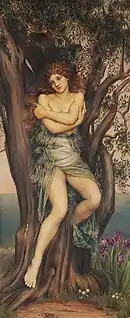dryad
English

Evelyn De Morgan, The Dryad, 1884–1885
Etymology
From Old French driade (“wood nymph”), from Latin Dryas, Dryadis, from Ancient Greek Δρυάς (Druás, “dryad”), from δρῦς (drûs, “oak”), from Proto-Indo-European *derew(o)- (“tree, wood”); cf. Proto-Indo-European *dóru (“tree”).
Pronunciation
- IPA(key): /ˈdɹaɪəd/, /ˈdɹaɪæd/
- Rhymes: -aɪəd, -aɪæd
Noun
dryad (plural dryads)
- (Greek mythology) A female tree spirit.
- 1914, Hans Christian Andersen, “The Dryad”, in William Alexander Craigie, transl., Fairy tales and other stories:
- There it had stood for years, close beside a mighty oak, under which sat often the kindly old priest, who told stories to the listening children. The young chestnut tree listened with them: the Dryad inside it, who was still a child, could remember the time when the tree was so small that it only reached a little higher than the ferns and long blades of grass.
- mountain avens, dryas
Translations
female tree spirit
|
Anagrams
This article is issued from Wiktionary. The text is licensed under Creative Commons - Attribution - Sharealike. Additional terms may apply for the media files.